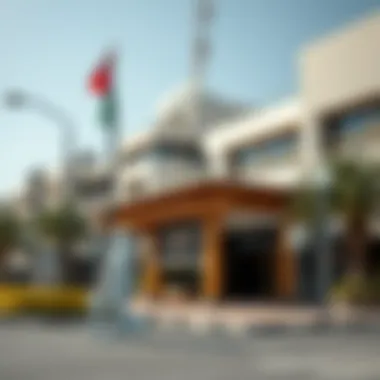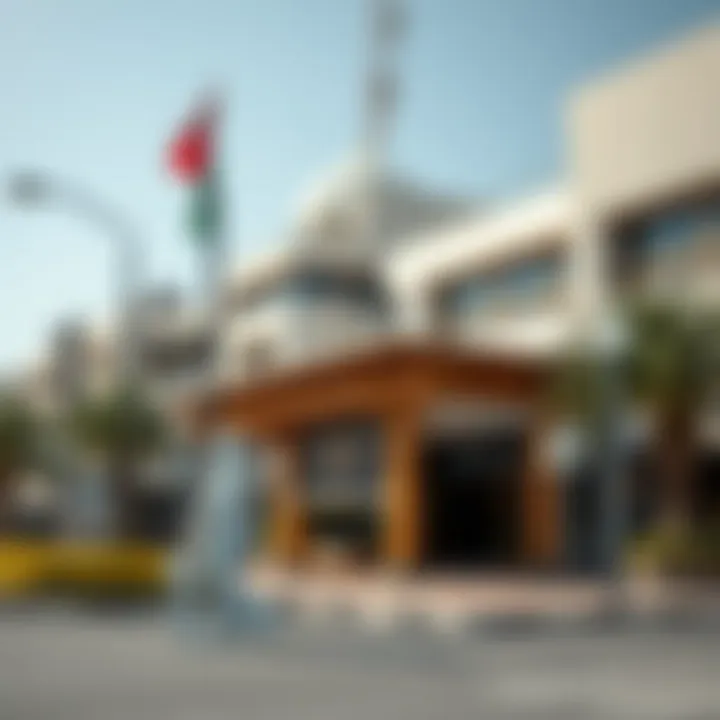Safety Evaluation in the UAE: A Detailed Overview


Intro
Safety has always been a top concern for individuals and families considering moving to or investing in a new country. In the United Arab Emirates, particularly, this concern resonates even more given its rapid development and diversification. Often regarded as a land of opportunity, the UAE attracts tourists, expatriates, and investors from diverse backgrounds. However, understanding the safety landscape in the region is essential for making informed decisions.
This analysis aims to shine a light on the multifaceted nature of safety in the UAE. From examining crime statistics that reflect real dangers to delving into government initiatives designed to ensure public security, every element plays a pivotal role in shaping perceptions and realities.
As we embark on this exploration, it is crucial to remember that safety isn't just a matter of statistics. It's interwoven with cultural aspects and everyday experiences that shape the lives of people here. Whether you are looking to live, work, or vacation in the UAE, being aware of these nuances can significantly impact your choices and plans.
In this article, we will navigate through various depths of this topic—a meticulous inquiry into crime rates, the effectiveness of law enforcement, and the societal aspects that contribute to a serene living environment. We'll also explore how the ongoing investments in infrastructure, technology, and public services enhance residential security.
The insights gathered in this piece aim to furnish prospective residents, investors, and travelers with the relevant knowledge, enabling them to evaluate safety measures that align with their needs. It's not merely about analyzing data; it's about experiencing the UAE’s unique blend of modernity and tradition in a safe setting.
Prolusion to Safety in the UAE
Understanding safety in the UAE is not just a matter of curiosity; it's a necessity for anyone considering moving, investing, or traveling within the region. The perception of safety here carries significant weight, influencing decisions for residents and investors alike. It's essential to navigate this multifaceted landscape that intertwines cultural norms, government policies, and individual experiences.
Understanding the Context
The UAE, a collection of seven emirates, stands out as a unique fusion of modernity and tradition. While it boasts some of the tallest skyscrapers and luxurious shopping malls, the societal fabric is deeply rooted in heritage and cultural values. Safety in this context is shaped not only by law enforcement measures but also by societal attitudes and mutual respect across various nationalities.
Understanding the local landscape is vital. A visitor's experience in Abu Dhabi might differ considerably from a resident's perspective in Dubai or Sharjah, revealing distinct safety dynamics at play. Each emirate has distinct characteristics, often influencing how safety is perceived and experienced by both locals and expats. In recent years, the UAE has also been lauded for its proactive steps in maintaining public safety, akin to a well-oiled machine. The low crime rates and robust law enforcement systems contribute significantly to this safe environment, forming a bedrock for stability and growth.
Furthermore, the historical context of the region matters. In a relatively short span, the UAE has transformed from a collection of fishing and trading communities into a global hub for business and tourism. This rapid development requires an equally robust commitment to safety and security to attract international attention and confidence.
Importance of Safety for Residents and Investors
Safety is paramount for residents in the UAE, not just as a fundamental need, but as a cornerstone for the quality of life. For investors, a safe environment is an alluring proposition; it translates into stability, trust, and potential for growth. When deliberating on investment opportunities—be it real estate, business ventures, or even tourism—safety is often the first criterion scrutinized.
Safety in the UAE engenders a sense of comfort for families and individuals alike. The country is known for its low crime rates; however, even the perception of safety can significantly influence the happiness of its residents. The sense of security leads to higher engagement in community life, participation in cultural events, and overall satisfaction with living conditions.
For investors, the implications of a safe environment are clear. A secure location attracts business ventures and encourages local entrepreneurship. When the populace feels safe, they tend to spend more freely, thereby stimulating economic growth. This is often reflected in investments in sectors such as real estate, tourism, and retail. In a nutshell, investors and residents alike stand to benefit significantly from the intricate safety landscape in the UAE, making it a vital point of consideration.
Safety is more than just the absence of crime; it's a critical ingredient for community cohesion, trust, and prosperity in any thriving society.
Overview of Crime Rates in the UAE
Understanding crime rates within the United Arab Emirates is crucial, particularly for individuals contemplating relocation, investment, or travel within the region. Safety considerations are paramount to both residents and expatriates alike. A closer look at crime rates provides a nuanced perspective on security, helping inform decisions about lifestyle and investment. It's essential to dig into actual statistics as well as to understand the context around these numbers to develop a thorough understanding of what safety means in the UAE.
Crime rates convey more than mere statistics; they mirror societal issues, governmental effectiveness, and even economic trends. The fluctuations in crime rates can hint at shifts in public policy and law enforcement strategies. For investors and homeowners, comprehending these implications assists in assessing potential risks, be it in property values or community wellbeing.
This section will focus on two major aspects: first, a detailed analysis of crime statistics and, second, an overview of crime trends over the years. Each of these elements will shed light on not just the numbers but the broader picture of security in the UAE, enabling a more informed view of its safety landscape.
Analyzing Crime Statistics
When examining the crime statistics in the UAE, context is key. The nation is widely recognized for its low crime rates compared to global standards. According to the World Population Review, the overall crime rate in the UAE is notably lower than that of many Western nations. This statistic serves as a beacon of safety and a major draw for expatriates.
Recent figures indicate that violent crime, in particular, is exceedingly rare. For instance, the Dubai Police reported that in 2021, crimes like murder and serious assaults were practically non-existent. More common property crimes include petty theft and fraud, yet even these incidents are relatively few. Therefore, crime statistics paint a favorable picture of safety in the Emirates.
However, it's essential to keep in mind that statistics alone do not tell the entire story. The proficiency of law enforcement contributes significantly to maintaining safety. The UAE has invested heavily in its police forces, along with groundbreaking technology to combat crime effectively. Furthermore, the strong cultural emphasis on family and community values creates an environment that discourages crime, resulting in fewer incidents across the board.
- Crime rates in urban areas such as Dubai and Abu Dhabi remain lower compared to many global cities.
- Issues such as petty crime may arise during busy tourist seasons, but these do not usually require significant police intervention.
- Government initiatives focusing on safety awareness and community policing have proven effective in building trust between the population and law enforcement.
Crime Trends Over the Years
Monitoring crime trends over time reveals fluctuations that can provide significant insights into the evolving safety landscape in the UAE. From 2010 to 2020, there has been a discernible decline in certain categories of crime, highlighting the effectiveness of targeted policing strategies and community-focused initiatives.
"A steady decrease in crime rates has transformed the UAE into a safe haven for both residents and visitors alike, as policing methods continue to adapt to emerging challenges."
- Technological and social advancements over the years have played a role in this downward trend. The introduction of smart policing applications has allowed residents to report crimes quickly and conveniently, further enhancing community safety.
- Notably, the COVID-19 pandemic created unique challenges. During 2020, there was an uptick in domestic disputes, as confined living conditions took a toll on mental health. Yet, law enforcement tackled these adjustments adeptly, maintaining overall safety.
- Meanwhile, it’s remarkable to recognize that major events, such as the Expo 2020 in Dubai, brought about enhanced security measures that likely influenced crime data positively. Increased security for large gatherings often leads to lower crime rates in the surrounding areas.
Government Measures to Ensure Safety


The safety and security of both residents and tourists in the United Arab Emirates hinge significantly on the measures taken by the government. Understanding this framework is essential as it helps individuals make informed choices about living in or investing in this vibrant region. The UAE government prioritizes public safety through a multi-faceted approach involving law enforcement, sound legislation, and innovative technologies. These elements work together to create an environment where people can feel secure.
Law Enforcement Agencies
The backbone of safety in the UAE is its robust law enforcement agencies. The police forces across various emirates exhibit a high degree of professionalism, discipline, and dedication. For instance, the Dubai Police force is renowned for its proactive strategies in crime prevention and community policing. In 2019, they launched the Smart Police Station initiative, allowing residents to report crimes and access services 24/7 without the need for human interaction. This illustrates a commitment to making policing accessible and efficient.
Moreover, law enforcement agencies often collaborate with international bodies and local communities to forge a strong network of security. It’s important when considering the UAE as a home or business location, to understand that these agencies frequently hold open events to educate the public about safety measures, encouraging a culture of vigilance and awareness.
Legislation and Public Safety Policies
Legislation plays a crucial role in ensuring public safety in the UAE. The legal framework encompasses various areas, from criminal justice to anti-terrorism laws. The UAE Penal Code, for example, enforces strict penalties for offenses such as drug trafficking and smuggling. These laws not only deter criminal activity but also reflect a societal commitment to maintaining harmony.
In addition, the government has enacted policies that promote public safety at a community level. Programs such as the "Community Policing Initiative" aim to build trust between law enforcement and the public. This initiative involves community members in safety discussions, encouraging collaboration in crime prevention. Such legislation does not merely serve as a guideline but conveys the message that safety is a shared responsibility.
Technological Innovations in Policing
In recent years, the UAE has leveraged technology to enhance safety measures significantly. The integration of advanced surveillance systems, drones, and AI-driven analytics has transformed the policing landscape. For example, the introduction of facial recognition technology in public places has helped law enforcement agencies identify suspects swiftly. This technology not only aids in the rapid response to incidents but also serves as a powerful deterrent against potential crimes.
The government's focus has extended to cyber security as well. Initiatives to safeguard digital platforms from malicious activities reflect an awareness of modern threats. The establishment of the UAE Cyber Security Council is a step towards ensuring that individuals and businesses alike can operate in a secure environment, reinforcing public trust in safety protocols.
"Safety in the digital realm is just as crucial as safety in physical spaces, and the UAE is leading the charge in this innovation."
Understanding these government measures provides valuable insight into the UAE's commitment to security. Residents and investors alike can take comfort knowing that the challenges of safety are being proactively managed through a collaborative and technologically advanced approach.
Cultural Influences on Safety Perception
Cultural factors play a pivotal role in shaping how individuals perceive safety in the UAE. These influences can be rooted in tradition, social behavior, and community values, deeply entwined with daily life in this diverse region. Immigrants and expatriates often bring their own cultural backgrounds, which can further enhance or challenge the prevailing views on safety. Understanding these influences not only sheds light on existing perceptions but is also essential for residents, investors, and visitors attempting to navigate the safety landscape.
Social Conditioning and Norms
The social fabric of the UAE is a tapestry woven from various cultures, beliefs, and traditions, creating a unique environment where perceptions of safety are honed. Many residents are conditioned to view the UAE as a haven for safety and security. This mindset stems from long-standing societal norms that prioritize respect for law, adherence to rules, and community harmony. In this melting pot of cultures, social conditioning leads to a mutual understanding of acceptable behaviors.
The key norms that shape perceptions of safety include respect for authority, community involvement, and a collective sense of responsibility. For instance, if a resident sees their neighbor actively participating in community guidelines, it serves as a reinforcement of a shared commitment to a safer environment. This community spirit creates a protective barrier against potential threats. Not only does it foster trust, but it also encourages individuals to reach out for help when needed, promoting a collaborative approach to safety.
Community Engagement Initiatives
Community engagement initiatives play a crucial role in fortifying the perception of safety. Various programs aim to bolster relationships between law enforcement and the public, promoting transparency and understanding among all parties involved. Local governments in Dubai and Abu Dhabi, for instance, have launched Police Meets Community events, where residents can directly interact with law enforcement officers. This direct line of communication cultivates trust and helps dispel misunderstandings regarding safety measures.
Moreover, initiatives like safety workshops and neighborhood watch programs empower residents to take proactive steps toward ensuring their own safety and that of their communities. These events often emphasize the importance of vigilance, open communication, and collaboration with local authorities.
Here are some notable benefits of these community initiatives:
- Enhanced trust between citizens and law enforcement: When residents feel they can engage with officers on a personal level, it fosters a supportive atmosphere.
- Increased awareness of personal safety: Informative workshops equip individuals with knowledge on handling emergencies or identifying suspicious behaviors.
- Strengthened neighborhood ties: Collaborative efforts encourage interactions among diverse cultures, creating a sense of belonging and shared responsibility.
Comparative Analysis: UAE vs. Global Safety Standards
When discussing safety in the context of the UAE, it's essential to draw comparisons with global safety standards. The UAE, particularly known for its progressive perspective on security and crime reduction, offers a unique blend of traditional values and modern enforcement mechanisms. This comparative analysis serves to enhance understanding of how the UAE's safety measures stack up against international benchmarks and highlights factors influencing safety perceptions and realities.
In this analysis, several key elements come into play. First and foremost, we consider the different environments found within the UAE. Urban areas like Dubai and Abu Dhabi are often bustling with activity, attracting both tourists and expats. In contrast, rural areas may have different crime dynamics and safety concerns stemming from cultural practices and community engagements.
Safety in Urban vs. Rural Settings
Urban regions typically showcase a more concentrated presence of law enforcement agencies and sophisticated surveillance systems, fostering a sense of security among residents. For instance, Dubai's innovative "Smart City" initiatives, which deploy advanced technology to monitor urban safety proactively, reflect trends found in major cities worldwide.
On the other hand, rural areas might rely more on community standards and personal relationships to maintain safety, often resulting in a different approach to security. Here we see:
- Strengths of Urban Settings: High police presence, integration of technology, and comprehensive emergency services.
- Challenges of Urban Settings: Higher potential for certain crimes, overcrowding leading to disputes or tensions.
- Strengths of Rural Settings: Close-knit communities create trust, often lower crime rates compared to cities.
- Challenges of Rural Settings: Limited resources for emergency response, fewer law enforcement personnel.
This differentiation is crucial as it sets the stage for how safety is perceived by residents and visitors alike. The urban versus rural safety dynamic showcases how cultural influences and resource allocation shape overall perceptions of security.
International Safety Rankings
International safety rankings offer another layer of understanding. These rankings, such as those provided by the Global Peace Index or the World Economic Forum, underscore how various countries manage their public safety and security measures. The UAE consistently scores favorably, placing it among the safest countries globally.


Factors contributing to these high rankings include:
- Low Crime Rates: The UAE reports some of the lowest crime rates in comparison to Western countries.
- Stringent Laws: Strict legal frameworks deter criminal activities, creating a stable environment.
- Community Engagement: Public safety policies encourage community watch programs and public participation in safety initiatives.
In closing this section, understanding safety in the UAE through a global lens is fundamental. By comparing urban and rural safety dynamics and evaluating the country's ranking in international safety, we grasp a more holistic picture of what makes staying and investing in the UAE appealing. This analysis not only enhances knowledge but also empowers potential residents, investors, and travelers to make informed decisions in relation to safety.
Real-Life Experiences: Safety from the Resident's Perspective
When discussing safety in the UAE, real-life experiences provide a crucial window into its ground realities. These narratives often shape perceptions among both residents and those considering moving to the region. Hearing from individuals who navigate the daily nuances of life in the UAE lends a textured understanding that statistics or government reports might overlook.
The stories of residents can illuminate several elements about safety: how crime feels like on the ground, how effective emergency services are, and the overall sense of community trust. They often highlight patterns that might not appear in crime rates or official policies. This section addresses the importance of listening to these voices and how they reflect the broader picture of safety in this dynamic region.
Interviews and Testimonials
Incorporating firsthand accounts into our analysis significantly enriches the narrative on safety in the UAE. Residents from various backgrounds often share their unique perspectives, revealing both the challenges and the comforts they face in their daily lives.
For instance, a long-term expat living in Dubai might recount their experience of feeling secure enough to walk alone in their neighborhood late at night. They may describe how local law enforcement has become more approachable, reflecting a shift in community relations. In contrast, some might bring to light stories of past incidents that left them feeling uneasy.
Interviews can be powerful tools to showcase a spectrum of experiences. For example:
- "I've lived in Abu Dhabi for five years, and I honestly feel safer here than in my hometown. The police are always visible and helpful."
- On the other hand, an expat from a different culture might say, "Back home, we would never trust the police like that; it takes time to adjust here."
These insights can guide newcomers in understanding their surroundings better and navigating community life. Ultimately, testimonials affirm or challenge the broader statistics, providing a human context to abstract figures.
Common Concerns Among Expats
As elucidated through experiences shared, concerns among expats tend to vary widely yet often overlap in several areas. Frequently voiced worries include:
- Cultural Differences: Newcomers often feel apprehensive about missteps in cultural etiquette, which might lead to misunderstandings.
- Emergency Services: There can be skepticism about the response times of emergency services and their effectiveness, especially in urgent situations.
- Crime Rates: Despite reports of low overall crime, concerns about petty theft or scams can loom large, particularly in densely populated areas.
These concerns show how the perception of safety runs deeper than mere statistics. They reflect emotional and psychological facets, influencing how comfortable individuals feel in their surroundings.
Being informed about these common worries can aid residents and expats in developing strategies for enhancing personal safety, creating a support network, and fostering a community where concerns are openly discussed. For example, knowing local emergency numbers, engaging in community watch programs, or simply conversing with neighbors can alleviate some fears.
Safety in Specific Regions of the UAE
When diving into the intricate landscape of safety in the UAE, one cannot overlook the significance of regional differences. Each emirate possesses its unique characteristics, influencing both the physical safety and the overall perception of security among residents and visitors alike. Factors such as local governance, cultural norms, and socioeconomic conditions play pivotal roles in shaping safety in these areas. Understanding these nuances is crucial for investors, homeowners, and expatriates, as their experiences may vary drastically depending on where they are situated within the UAE.
Dubai
Dubai stands as a beacon of modernity, but beneath the glitzy veneer lies an equally sophisticated framework for safety. As one of the most populous emirates, the security administration works tirelessly to maintain order in a bustling environment that attracts millions of tourists and business professionals. The city has invested heavily in law enforcement and emergency services, ensuring rapid response times and a significant police presence. Moreover, technological advancements, such as the integration of smart surveillance, contribute to the overall safety landscape, identified as a best practice for other global cities.
In a striking illustration, a recent initiative saw the deployment of drone technology in monitoring both traffic and public spaces. This proactive approach not only minimizes incidents but also enhances the sense of security among residents and visitors. Despite the urban setting, Dubai fares well in crime statistics, showcasing considerably low rates for more serious crimes when compared to most global metropolitan areas.
The community's engagement in safety awareness campaigns has further solidified the collective responsibility toward public safety. Regular workshops, aimed at educating citizens on emergency protocols and crime prevention, highlight the importance of community cohesion in keeping safety ratings high.
Abu Dhabi
As the capital, Abu Dhabi has a distinct safety profile that reflects its political significance and slower-paced lifestyle. The emirate boasts a well-respected police force and is known for its significant investment in public safety infrastructures, including state-of-the-art emergency response systems. Here, the transparency of governance plays a prominent role in fostering trust between authorities and the public.
Interestingly, Abu Dhabi’s safety landscape is supported by a network of community policing initiatives that focus on building rapport with residents. This approach helps demystify the role of law enforcement while enhancing the responsiveness of the police to local concerns. The result is a community perspective that feels secure and valued, seeing the police not simply as enforcers but as partners in safety.
Furthermore, Abu Dhabi’s commitment to cultural preservation juxtaposes its modern developments, leading to a unique environment where traditional values are respected, but contemporary safety measures are firmly established. This balance delights expatriates and long-term residents alike, often leading them to express a deep sense of belonging and security.
Sharjah and Other Emirates
Sharjah, while often overshadowed by its illustrious neighbors, boasts a distinct focus on family-oriented values and community safety. The emirate's laws and regulations promote social order, contributing to its classification as one of the safest areas within the country. However, the safety narrative in Sharjah also includes challenges; the perception of safety might be affected by its stricter social norms, which can be surprising for newcomers. Yet, these very norms are integral to promoting general safety and reducing crime, creating an environment that values community welfare.
On the other hand, the smaller emirates are often perceived as quieter and safer, but the reality on the ground can be quite different. For instance, Ras Al Khaimah and Fujairah present an intriguing case where crime rates are particularly low, yet the infrastructure for security may not be as robust as more developed areas. The rural and tranquil settings might present unique safety considerations for investors or residents moving from vibrant urban centers who may not be familiar with local customs and practices.
Adapting to and embracing these cultural elements is essential for those looking to settle in or invest in these regions.


Understanding safety in specific regions of the UAE is paramount to making informed decisions, whether one is looking to invest, move, or simply visit.
Ultimately, grasping the distinctions in safety dynamics among the various emirates enables investors, homeowners, and expatriates to manage their expectations and plan their lives with greater confidence.
Public Perception of Safety in the UAE
Understanding how safety is perceived in the UAE is crucial for diverse groups, such as investors, expatriates, and local residents. This perception does not merely serve as an abstract idea; it directly influences practical choices, emotions, and overall satisfaction. When individuals feel secure, it reflects not only on their personal well-being but also on economic vitality and social harmony.
Survey Findings and Analysis
Surveys play a pivotal role in establishing the public perception of safety. Through various methods, including online questionnaires and focus group discussions, researchers gather vital data reflecting how different communities view safety initiatives and crime trends.
A recent survey conducted by Gulf News showed that about 80% of residents feel safe walking alone at night in their respective neighborhoods. This statistic underscores the pervasive belief in the UAE's safety ethos, rooted in stringent law enforcement and proactive community policies. Additionally, many residents emphasized the effectiveness of local security measures, like neighborhood watch programs and rapid police response times, noting how these contribute to their sense of security.
On the other hand, the same survey revealed that 30% of participants expressed concerns about petty crimes, particularly in crowded places like shopping malls and during public events. Such findings indicate that while there is an overarching trust in safety, specific areas still present concerns worthy of examination.
"Safety is not merely the absence of crime, but the presence of opportunities for peace and security among communities."
— Community Safety Expert
Impact of Media Portrayal
The media plays a vital role in shaping public perception of safety. News coverage can leans somwhat dramatic, focusing on incidents that may not effectively convey the overall safety climate. Stories of street crime or accidents, when highlighted excessively, can create a narrative that goes against the factual safety statistics.
For instance, international reports often amplify isolated incidents into broader fears, leading to misconceptions about living conditions. Platforms like BBC, CNN, and local outlets like The National can sway public opinion significantly. Articles presenting crime in sensationalist tones may lead prospective residents to view the region as a riskier place than it is.
However, it’s crucial to note that local digital platforms, public social media discussions, and even neighborhood community pages work to balance perspectives. These platforms encourage dialogue among residents, helping to instill a sense of community trust and offset any negative media narratives. More importantly, they allow voices—both positive and critical—to come forth, creating a holistic depiction of safety in the UAE.
By being aware of how both quantitative survey findings and qualitative media portrayals contribute to shaping perceptions, readers can better navigate their understanding of safety in the region. This duality is essential not just for those living or traveling in the UAE but also for investors seeking a sound environment for business endeavors.
Safety Tips for Residents and Visitors
When considering relocation or a visit to the UAE, one of the paramount concerns is personal safety and security. Given its rapidly growing urban landscape and the influx of expatriates from various backgrounds, understanding safety tips for residents and visitors is essential. These guidelines not only enhance the overall experience but also alleviate any uneasiness one might feel in a new environment. Whether it’s knowing how to blend in with local customs or being aware of emergency contacts, such knowledge is of utmost importance.
Practical Advice for Living in the UAE
Living in the UAE, particularly in bustling metropolises like Dubai and Abu Dhabi, comes with its own unique set of challenges and joys. Here are some practical tips that residents, especially new expatriates, should keep in mind:
- Be mindful of cultural norms: The UAE is a melting pot of cultures, but it's crucial to respect local traditions and laws. For example, public displays of affection may not be well-received in certain contexts. Understanding these norms can help avoid any unintentional offenses.
- Stay informed about local laws: Familiarize yourself with the laws specific to the emirate you're residing in. For instance, the punishments for petty crimes can be severe, including harsh penalties for drug offenses. Knowledge is power in this regard.
- Use reputable transportation services: Whether using taxis or ride-sharing apps like Careem, ensure they are reliable options. It is better to avoid hailing random cabs off the street, as they may not be regulated.
- Secure your belongings: Petty theft, while rare, can occur. It is advisable to keep valuables secure and avoid leaving them unattended in public places. Simple precautions can go a long way in ensuring personal safety.
- Connect with the community: Joining local expat forums or groups, such as those found on platforms like Facebook or Reddit, can provide support and resources for those new to the region. Community engagement can offer insight into local life and generate a sense of belonging.
Navigating Emergency Services
Understanding how to navigate emergency services in the UAE is another critical aspect of safety. Here’s what residents and visitors should know:
- Know your emergency numbers: In the UAE, dialing 999 reaches the police, while 998 is designated for ambulance services. Memorizing these numbers can be your first step towards ensuring safety in case of emergencies.
- Access to healthcare: The UAE boasts an excellent healthcare system, with public and private healthcare services available. Familiarize yourself with the nearest hospital or clinic to your location.
- Be aware of emergency evacuation procedures: Many residences and establishments have specific evacuation protocols in case of emergencies like fires or natural disasters. It's beneficial to be aware of these procedures and where the emergency exits are located.
- Stay updated on safety resources: The UAE government provides numerous resources online for safety tips and updates, especially during events like the ongoing pandemic. Regularly check official websites such as https://www.government.ae/en/information-and-services/health-and-fitness/covid-19-updates for the latest guidelines.
"Having a solid understanding of safety tips enhances not just your own peace of mind, but also contributes to the feeling of security for those around you."
By considering these safety tips, anyone can significantly enhance their experience in the UAE, making the most of what this dynamic region has to offer while ensuring their personal safety and well-being.
Finale: Assessing Safety in the UAE
The importance of concluding discussions about safety in the UAE is critical in understanding the multifaceted nature of security in this region. The insights gathered throughout the preceding sections provide a thorough exploration of diverse elements such as crime rates, government initiatives, cultural perceptions, and real-life experiences. This conclusion serves not just as a summary, but also a vital tool for potential investors, residents, and tourists looking to navigate their journey within the UAE safely and effectively.
Summary of Key Findings
In summary, the evaluation of safety within the UAE has revealed several important findings:
- Low Crime Rates: The UAE consistently ranks among the safest countries globally, with crime statistics showing a significant drop in violent crimes.
- Government Commitment: Government policies that focus on enhancing public safety through law enforcement, legislation, and technology play a crucial role in maintaining this security.
- Cultural Perspective: Social norms and community engagement influence how safety is perceived, with residents feeling generally secure in their surroundings.
- Real-Life Experiences: Interviews with residents and expatriates indicate a strong sense of safety, despite the occasional concerns raised regarding specific issues.
- Regional Variations: Differences in safety perception and actual crime rates can be observed in various emirates such as Dubai, Abu Dhabi, and Sharjah, each presenting a unique environment for residents and visitors alike.
These points illuminate a landscape where safety does not merely exist as a statistic but is actively shaped by policies, community involvement, and personal experiences.
Final Thoughts
Ultimately, assessing safety in the UAE transcends mere analysis of numbers and reports. It encapsulates a dynamic interplay of cultural, governmental, and personal factors that define the living experience in this remarkable region. For anyone considering a move or investment, understanding these details is not just beneficial but imperative.
The UAE offers a distinctive blend of safety and stability unmatched by many other countries. However, it remains essential for individuals to remain vigilant and aware of their surroundings, engaging with local customs and recommendations from authorities. This proactive approach ensures not only personal security but also enhances the overall experience of life in the UAE.
In essence, navigating the safety landscape in the UAE allows for informed decisions, fostering a sense of security which can lead to greater peace of mind for residents and investors alike. As the saying goes, "An ounce of prevention is worth a pound of cure"; being aware of safety considerations will lead to a more joyful and secure experience in this diverse and vibrant nation.
For further insights or resources, explore links on safety regulations and guidelines at gov.ae.



